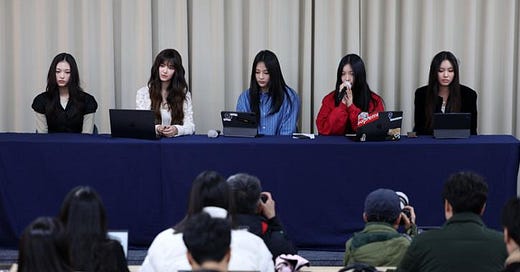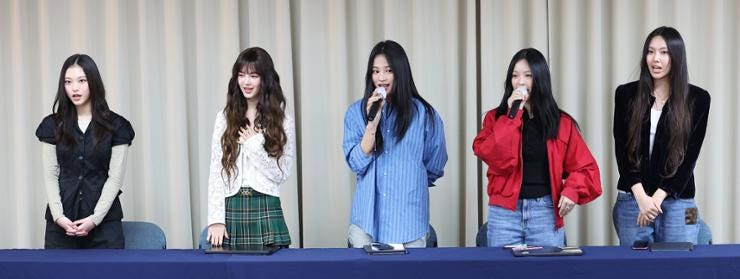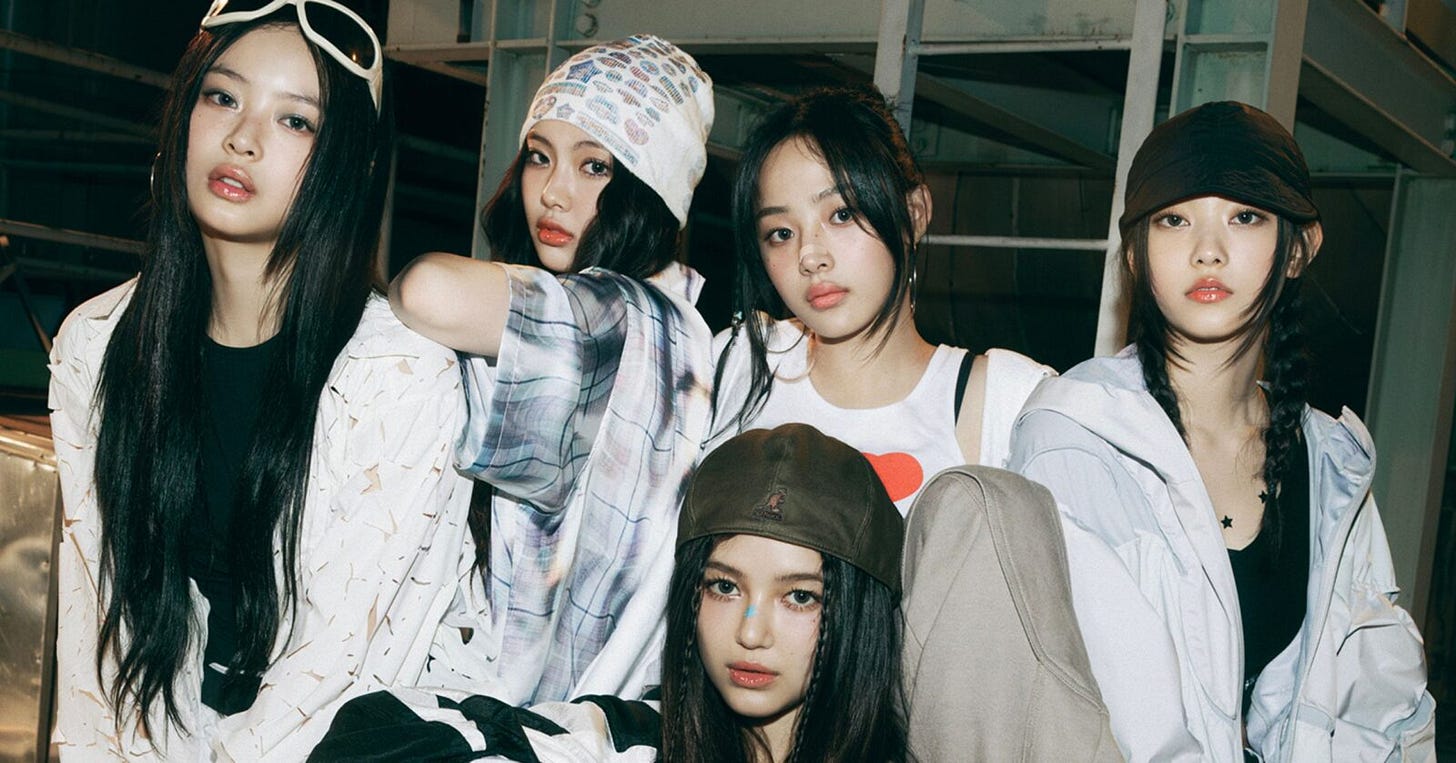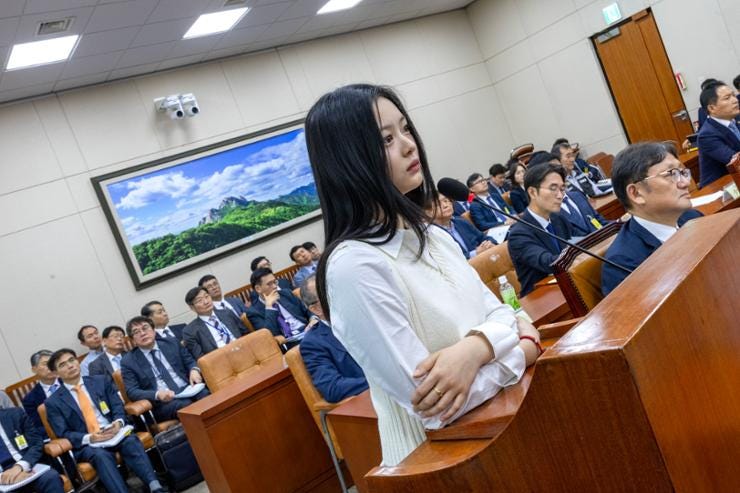What NewJeans' situation can teach us about labour rights for K-pop artists
And is it time for K-pop artists to unionize?
(Photo credit: Yonhap)
NewJeans surprised much of the K-pop world last week when they held an emergency press conference, announcing the termination of the band’s exclusive contract with their agency ADOR.
NewJeans—composed of Minji, Hanni, Danielle, Hyein and Haerin—say they are leaving ADOR due to “mistreatment” and “manipulation.” Meanwhile, ADOR has maintained that the company’s contract agreement with NewJeans “remain in full effect”, and that they have not violated any terms.
NewJeans’ departure comes two weeks since the band sent a legal notice to HYBE (which ADOR is a subsidiary label) outlining a list of demands. Among the demands included the reinstatement of Min Hee-Jin as ADOR’s CEO, a formal apology from the manager who had previously told a HYBE group to ignore NewJeans member Hanni, the deletion of leaked videos and photos of the group that were used without consent, and the protection of NewJeans' unique identity. NewJeans threatened to terminate their contract with ADOR if their demands were not met.
NewJeans’ announcement is just the latest development that comes during a months-long legal battle involving HYBE and ADOR’s former CEO Min Hee-jin. In October, Hanni also made international headlines for testifying at the National Assembly of South Korea on workplace harassment. But on November 20, Seoul’s Regional Office of Employment and Labour announced it had closed the investigation, as Hanni could not be considered an employee under the law.
Over the last couple of weeks, there has been much discourse around NewJeans and HYBE, ranging from praise to criticism. But in the midst of many discussions, several fans have also asked whether it’s time for K-pop artists to form a union.
To help make sense of NewJeans’ situation, I turned to CedarBough Saeji, an assistant professor of Korean and East Asian Studies at Pusan National University in South Korea.
She spoke to me about how the story is playing out in South Korea, the public’s support for NewJeans and why labour rights for K-pop artists should be considered.
NewJeans say they are terminating their contracts and leaving ADOR. Do you expect a long legal battle ahead?
I think that it has to be ADOR in the legal battle. I think that they don't really have a choice except for engaging in a legal battle. In Korea, there has been a lot of legal discourse online, and particularly the Korean press has been going to a lot of Korean lawyers.
How are legal experts interpreting NewJeans’ situation with ADOR?
NewJeans has [taken] this step of saying that there’s been a breach in trust and the contract is void. By saying this, they actually sort of tie the hands of ADOR because certain legal actions that ADOR could take would only demonstrate further that there has been a breach of trust, and then it would make it so that ADOR would lose any challenge.
Breach of trust or no breach of trust is like a he said, she said situation where different judges could definitely interpret the evidence differently. If we're just talking about a legal ruling about [whether NewJeans] can terminate based on breach of trust, yes, legally they can terminate based on breach of trust. That legal case would probably take a year or two years.
And during the course of that time, basically NewJeans would be free to continue to do whatever they chose to do because anything that ADOR did during that time would be proving there's been a breach of trust. I just think it's really interesting. In a way, it's kind of clever, like this sort of legal bind that ADOR is in.
So, ADOR does have to file a lawsuit to contest the validity of terminating this contract, and they do have to argue that there hasn’t been a breach of trust. They have no other argument. But basically, one judge could look at the same evidence and say there hasn’t been a breach in trust. And a different judge could look at the same evidence and interpret it differently.
I know you’re not a lawyer. But what does this mean about NewJeans' ability to perform and make music moving forward?
According to NewJeans’ interpretation of this legal situation, they can terminate because the contract says they can terminate if there is a breach of trust. According to NewJeans’ interpretation, they can be active, they can continue to release music and they can continue to have fan meetings and all that. They’ve even said that they plan to honour these commitments to their fans.
According to the way that NewJeans is interpreting it, they get to keep doing all of this stuff, and ironically ADOR can’t compel them to stop these independent activities because ADOR has to say there hasn’t been a breach in trust.
ADOR basically is going to play a waiting game where they can reap the benefits of anything that NewJeans does right now if the legal case goes their way.
If the legal case goes [ADOR’s] way and NewJeans gets pushed back in with [the company], then any music the band released, any fan meeting, becomes something NewJeans does under ADOR. And potentially, then there will be some redistribution of any funds that came from these activities. What [ADOR] can do is later try to get part of the pie.
(Photo credit: ADOR)
How unprecedented is a case like this?
I think it’s unprecedented. The way in which NewJeans is doing this seems very different because it’s very, very open and upfront. A lot of past legal problems between companies and artists have been rooted in cases of abuse, whether we are talking about slavery contracts, or being verbally assaulted in public.
This is not that. It’s been much more like, “Look, we have given you demands. You have not responded to our demands in a way that we want you to respond. And, your lack of appropriate response has a consequence. The consequences are that we are terminating the contract.”
It’s legitimate for ADOR, or HYBE, to say we couldn’t meet those demands. On the other hand, I think that there would have been potential for finding some compromises on enough of NewJeans’ demands that it could have seemed like they were seriously negotiating with them. But I don’t think [ADOR] were ever seriously negotiating. I think they were just like, “You are children and you are our product. We’re going to treat you like we have always treated idol artists.”
It’s just so amazing to me that the artists who have found their voice most prominently in the entire history of K-pop actually are quite young female artists. We could have been unsurprised if we were seeing much older male artists standing up for themselves.
But, these young female artists are like, “No, you’re not going to walk all over me. I’m going to talk to the National Assembly. You can’t treat me this way.” Their attitude of, “I’m going to stand up for myself” is definitely awesome.
(Hanni testifying at the National Assembly in South Korea in October. Photo credit: Yonhap)
Online reaction to this case has been met with praise to criticism. What do you make of the fan reactions coming out about this case?
It really drives me crazy how much this is mixed up in some sort of fandom for BTS and fandom for HYBE.
I do not understand people supporting HYBE in this mess because HYBE is a company that grew out of Big Hit Music, which is a company that was essentially made by the success of BTS and therefore made by ARMY [BTS’s fans].
You could analyze it as people feel some sort of ownership and some responsibility and some love for HYBE because of their connection with BTS. [Now] a group of young artists are coming in and turning that narrative on its head and saying, “This company is not a perfect place and what’s going on here is not as wonderful as you think it is.”
What’s the sentiment like in Korea, where you are right now?
I’m seeing mostly support. I am seeing a little bit of gendered, “Who are you young girls to be demanding so much when there are all these other people in your company who deserve better working conditions?” The perception is, you have become rich and famous. There are people in your company who have it much worse than you, but now you are potentially endangering their jobs. Like, the various support staff.
But in general, the discourse seems to be really supporting seeing change in the K-pop industry and supporting the bravery of the NewJeans members.
That can totally change if it becomes a long and drawn out messy battle. And particularly, if the case becomes too technical for people to follow. Netizens will get turned off pretty quickly.
These are boring legal accusations and people will stop paying attention pretty fast. And so right now, NewJeans is still able to hold a press conference and give one hour notice and get 100 reporters to show up. But I don't see that happening in a few months if it keeps being in the news.
There has been a lot of talk about K-pop artists unionizing. Is that something you see as a possibility?
There’s a few unions already. There’s an Artist Social Union, which is for the film industry. There’s Korea Broadcasting Actors Union, which does work with actors, voice actors and comedians.
There are some unions that are out there, and artist rights organizations. But until now, the way that agencies have made contracts for K-pop has precluded them from becoming involved or from making a union.
There are so many non-disclosure agreements that are signed. If you really want to unionize, part of what you have to do is information sharing. Unionizing is something which often is more attractive to people who are less empowered. But unionizing often is most successful when the people who have it better decide that they are willing to hold hands with the people who may not have it as good.
If you were to make a union that covered, let’s just say K-pop performers and not the support staff—who honestly also need unions—it has to be something initiated by [the artists]. And it’s going to be most successful if it’s initiated by people coming from a really large company like HYBE who are perceived as having potentially something to lose by unionizing, such as standardization of profit sharing and payment plans.
If you look at really successful groups like BTS, NewJeans or Seventeen, they are earning so much more than groups with small companies. If they agree to some sort of union idea of wages, profit sharing agreements and what percentage of fees of who goes to who, it’s very complicated.
What changes around labour rights would you like to see for artists?
I think there’s an argument to be made for making K-pop artists regular employees who get a certain monthly salary, which I think would create an environment without as much insecurity as many K-pop artists face right now.
The only reason why they’re not doing that right now is because this entire system is predicated on these crazy work hours. And if you make them a regular employee who gets a regular salary every month, then theoretically they also have the same limits on work hours that regular employees do, and then maybe they should be getting overtime pay. I think that that could also help with the mental health of K-pop artists.
It might mean that artists never get as rich as they can get right now. But there isn't a guarantee that an artist will become big. So you know, if you signed a contract that reduced your potential earning from becoming a huge star, but gave you regular working conditions, you would be potentially risking the money of becoming a huge star like BTS.
But on the other hand, if you were working 18 hours a day for seven years and never really taking off, this would probably be a better deal.
This conversation has been edited for length and clarity.
AUTHOR’S NOTE: Accountability is important to me, so please address corrections and concerns by sending me an email at bunnipopnewsletter@gmail.com. Continue the conversation by following bunni pop on Instagram, TikTok and Threads.










